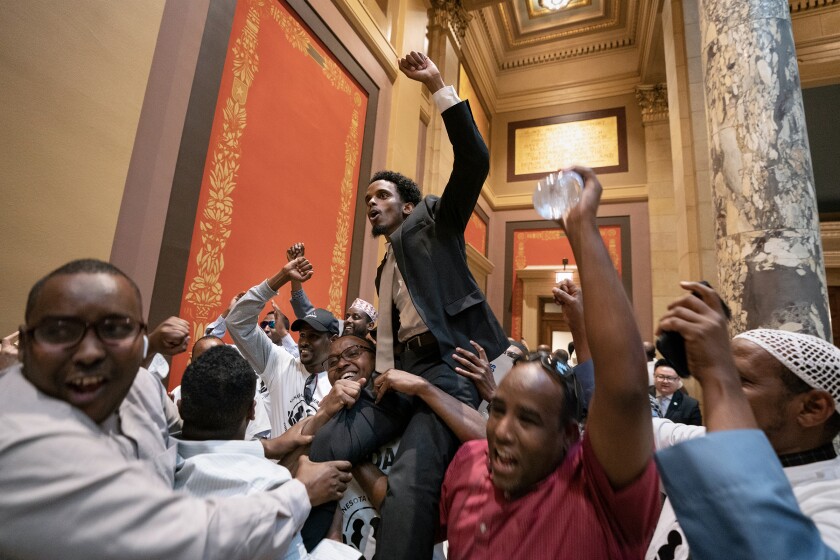ST. PAUL — Minnesota Gov. Tim Walz has vetoed a bill setting base pay and firing rules for ride-share drivers following a warning from Uber that the company would drastically cut back service in the state if the bill became law.
Instead of giving final approval to the bill, Walz on Thursday, May 25, signed an executive order commissioning a study to explore options for the industry to be considered in a later legislative session.
“Rideshare drivers deserve fair wages and safe working conditions. I am committed to finding solutions that balance the interests of all parties, including drivers and riders,” Walz said in a statement. “This is not the right bill to achieve these goals.”
It's Walz’s first veto since taking office in 2019.
Pressure continued to build on the governor to take action on the bill this week, which passed in the final days of the legislative session. He repeatedly told reporters at news conferences that he needed time to fully grasp the bill’s implications before making a decision.
ADVERTISEMENT
As a crowd of bill supporters rallied outside the governor's office Thursday, ride-share company Uber issued a statement warning it would drastically cut back service in Minnesota.
Supporters of a minimum wage for Uber and Lyft drivers gather outside Gov. Walz’s office urging him to sign rideshare bill. It passed Senate Sunday, but Walz hasn’t committed. Rideshare companies say the bill could cause fares to soar and limit service #MNLEG pic.twitter.com/PTOVwlfFRV
— Alex Derosier (@xanderosier) May 25, 2023
Uber spokeswoman Freddi Goldstein said if the bill became law the company would have to suspend service in Greater Minnesota and only offer premium ride services in the Twin Cities metro area starting Aug. 1.
“Following several months of unanswered requests to work with legislators on comprehensive legislation that provides flexibility and benefits to drivers without compromising service for riders, we are left with a bill that will make it impossible to continue serving most areas of the state," Goldstein said.
Bill sponsor Sen. Omar Fateh, DFL-Minneapolis, posted about his disappointment with the veto on Twitter, saying it was a testament to the power of business interests even in a state government completely controlled by the Democratic-Farmer-Labor Party.
“Today, we saw the power corporations hold on our government despite the trifecta,” he said in a tweet. “The fight is not over, and I promise you I won't back down. This will be my top priority going in to next session. I need you all more than ever”
Today, we saw the power corporations hold on our government despite the trifecta. After a year of stakeholder engagement, passing all required committees in both chambers, and both floors, the governor has vetoed the bill to improve working conditions for Uber/Lyft drivers.
— Senator Omar Fateh (@OmarFatehMN) May 25, 2023
While supporters say ride-share drivers are struggling amid soaring fuel and vehicle costs and lower compensation rates, Uber and competitor Lyft say the bill's current language would send fares soaring, putting service out of reach for middle- and lower-income customers. Lyft estimates rates could double, and on Sunday said it would have to leave many markets outside the metro if the legislation is enacted.
Both Uber and Lyft asked the governor to veto the bill. Lyft in a statement backed the creation of a task force study on how to balance worker and business concerns.
Fateh and backers say it's crucial to provide a living wage and basic employee protections for drivers, who are gig workers paid by companies under contract and lack similar protections to full-time employees.
ADVERTISEMENT

“The purpose of this bill is to correct a serious problem, an injustice and an abusive situation that exists toward drivers,” Fateh said Sunday night ahead of the bill's passage in the Senate.
Under the vetoed bill, minimum driver compensation rates for trips that start in the seven-county Twin Cities metropolitan area (Carver, Dakota, Hennepin, Ramsey, Scott and Washington) would start at $1.45 per mile and 34 cents per minute. In the rest of the state, the floor for driver compensation would start at $1.25 per mile and 34 cents per minute. Drivers would be entitled to 80% of a cancellation fee from the ride-share company if they’ve already departed to pick up a rider.
Once new rates would be implemented, they’d be adjusted based on inflation each year starting in July 2024.
Fateh said many drivers can be terminated without warning based on complaints that companies do not investigate. Protections against termination would require ride-share companies to disclose their policy on termination and provide an explanation to drivers as to why the company deactivated their driving accounts. Drivers could provide their side of a story and appeal a decision.
Supporters of the ride-share bill gathered outside the governor's office at the Capitol on Thursday afternoon as Walz signed a paid family and medical leave bill. Chants of "Governor, sign the bill!" echoed through the halls and could be heard inside the governor's reception room during the paid leave bill signing.
Asked if he'd sign the bill earlier Thursday, Walz said the "whole theme" of this year's legislative session was "fairness around workers," and that it was clear that the gig economy "doesn't work the way it should."
Follow Alex Derosier on Twitter @xanderosier or email aderosier@forumcomm.com .
This story was last updated at 7:06 p.m. May 25 with quotes after Walz's veto. It was originally posted at 4:23 p.m. May 25.













